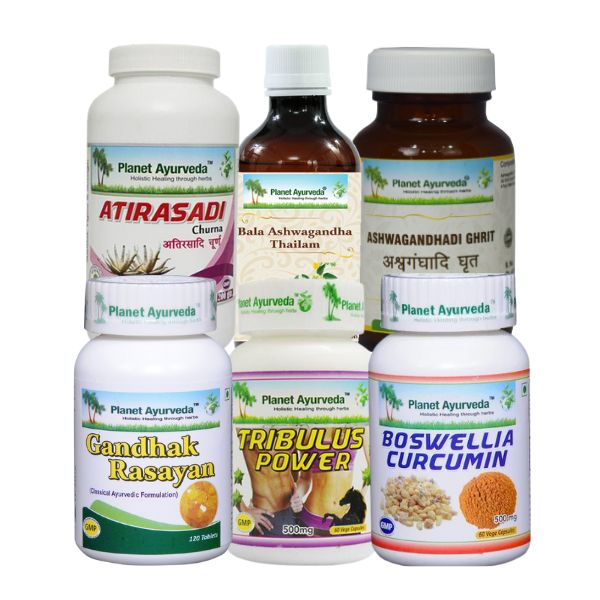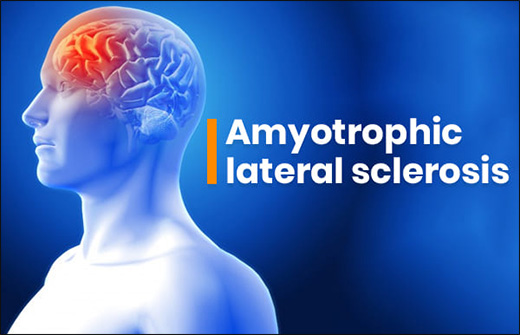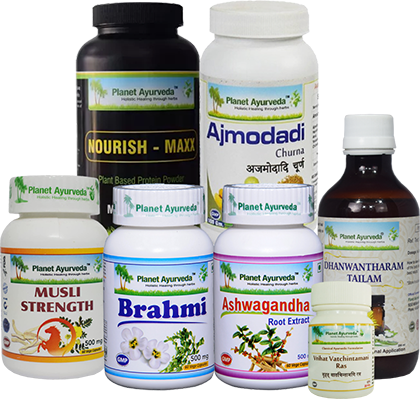Myotonic Dystrophy Symptoms And Treatment By Ayurveda
Abstract
As the name suggests dystrophy means the wasting away of tissues or organs. Muscular dystrophy is a genetic disorder in which there is a progressive loss of muscle or degeneration of the muscle leading to muscle weakness. Depending upon the type or severity of the disease symptoms are mild or progressive. Patients having mild symptoms or slow progression have an average life span whereas patients with severe symptoms have a very short life span. There are several types of muscular dystrophy such as Duchenne muscular dystrophy, becker’s muscular dystrophy, myotonic muscular dystrophy, congenital muscular dystrophy, and many others. Here in this article, we shall be discussing Myotonic dystrophy with its causes and symptoms in detail with its management in Ayurvedic as well as modern aspects.

Introduction
Myotonic dystrophy is a type of muscular dystrophy. It is a group of inherited disorders in which there is a mutation of genes. Myotonic dystrophy is a genetic mutation in which there is progressive muscle weakness and wasting. It is the most commonly occurring dystrophy in adults. Its symptoms usually appear in the 20s or 30s. The wasting of the muscles worsens with time. The most common symptom includes myotonia which is muscle finds difficulty relaxing after it contracts. Other major symptoms include clouding of the lens causing cataracts, and electrical signaling between the heart nerves is impaired that controls the heartbeat.
Myotonic Dystrophy is of two types type 1 and type 2. Both are having overlapping signs and symptoms but type 2 shows milder symptoms than type 1. In both types of myotonic dystrophy, different gene mutations occur.
● Type1: distal muscles of the body are most affected (face, neck, hand, lower legs ). It is characterized by birth or congeniality. In congenital types there occurs hypotonia (weak muscle tone), clubfoot (inward and upward turning of the foot), delayed development or milestones, breathing issues, intellectual difficulties, etc. It is specifically known as Steinert disease.
● Type 2: Proximal muscles are primarily affected (shoulders, hip, elbows, etc). It is milder than type 1 and does not have congenital onset and rarely begins in childhood.
PREVALENCE: 1 in 8000 people is affected by myotonic dystrophy.
Type 1 is more common than type 2. The occurrence of two types of myotonic dystrophy varies differently according to the geographical area.
CAUSES OF MYOTONIC DYSTROPHY
Myotonic dystrophy is an inherited autosomal dominant disorder.
Type 1 is caused by a mutation in the DMPK gene while type 2 results from a mutation in the CNBP gene.
The DMPK gene helps in communication within the cells. It corrects the functioning of cells of the heart, skeletal, and brain muscles. While CNBP regulates the functioning of other cells.
SIGNS AND SYMPTOMS
● Lengthy muscle contraction (myotonia)
● Temporary jaw lock
● Clouding of the lens (cataract)
● Conduction defects in the heart defect in the signaling in the heart that controls the heartbeat
● Slurred speech
● Diabetes
● Breathing issue
● Intellectual disabilities
● Delayed milestones or milestones
● Life-threatening
● Difficulty in swallowing
● Difficulty in contracting uterus muscles lead to difficulty in labor
● Cognitive behavior abnormality
● Mood and anxiety disorders
DIAGNOSIS
● Physical examination
● Electromyography (EMG)
● NA testing (for DMPK and CNBP gene)
AYURVEDIC ASPECT AND MANAGEMENT
Ayurveda is the ancient science that means “science of life” and believes in holistic healing. Ayurveda helps us to heal, originated in India more than 3,000 years ago. This helps us to place great emphasis on relieving the disease and helps to balance our doshas in a traditional manner. According to Ayurveda, our body is formed of seven types of tissues called sapta dhatus. These are as dhatu (plasma), rakta dhatu (blood), maans dhatu (muscles), meda dhatu (fat tissues), asthi (bone tissues), majja (bone marrow), Shukra dhatu (reproductive system). Depletion or decrease in the dhatus is known as dhatu kshaya.
Myotonic dystrophy in Ayurveda is directly related to Maans Dhatu kshaya. Conversion of rasa dhatu into rakta and rakta dhatu into maans dhatu and so on till shukra dhatu is due to seven dhatu agnis (fires). All the seven agni in their active form converts all the dhatus into other and the whole body works in harmony. But if there is impairment in any dhatu agni there is impaired formed dhatus. In Myotonic dystrophy, the conversion of Rakta dhatu into Maans dhatu is impaired thus leading to poorly formed Maans dhatu (muscle tissue). Maans dhatu (muscle tissues) get nutrition from ras dhatu (blood). Thus the symptoms of muscle weakness occur as a result. The symptom is mentioned in the Ayurvedic context as “spik grieve udarshushkata” which means emaciation and weakness of the buttocks, neck, and abdomen.
Our body is composed of three body humor called doshas vata, pitta, and kapha dosha. For the body to work in harmony all three doshas needed to be in a balanced state. Kashaya of Maans Dhatu decreases the kapha dosha and increases in vata dosha. Elevation of vata dosha gives symptoms like impaired cognitive behavior, intellectual disabilities, anxiety disorders, etc.
Management
There are a few effective herbs that are recommended in Ayurveda for the management of myotonic dystrophy.
1. Ashwagandha (Withania somnifera): Ashwagandha is a rasayana that is a rejuvenator that helps in promoting the growth of muscle cells hence restoring muscle mass.
2. Giloy (Tinospora cordifolia): Giloy or amrita acts as an anti-inflammatory that reduces damage in muscle tissues. And is a potent antioxidant that saves the body from free radical damage
3. Brahmi (Bacopa monnieri): It helps in repairing the damage to the nerves enhancing their functions and increasing muscle mass.
4. Arjuna (Terminalia arjuna): It relieves cardiac complications. Improving heart functioning, easing breathing, and improving quality of life.
Other helpful ways to manage myotonic dystrophy are panchakarma therapies along with some oral medications and some yoga asanas. Panchakarma therapies include udvartana (massaging with herbal powder), abhyanga (oil massage), Sweden (steam), nasya karma (nasal oil), Karna poor (oil in ears), sneha pana followed by vire chan (purgation), Shiro Basti, Shirodhara, shiro pichu, mustadiyapana Basti (medicated enema). Some of the yoga asanas recommended are Tad asana, Padahastasana, Trikonasana, Paschimottanasana, Pawanmuktasana etc with pranayam.
HERBAL REMEDIES FOR MYOTONIC DYSTROPHY BY PLANET AYURVEDA
Planet Ayurveda is a herbal manufacturing unit and is a renowned GMP-certified company. Products prepared by Planet Ayurveda are 100% pure, herbal, vegetarian, and natural supplements formulated under the supervision of MD experts. The formulation is in the form of votes (tablets), churan (powder), liquids, jams, and capsules. With the goodness of herbs, Planet Ayurveda has formulated many formulations for the Ayurvedic management of the polycystic ovarian disorder. All the herbs are formulated under the guidance of the Ayurvedic Context. These herbs are pure and unadulterated. All these herbal remedies are free from preservatives, additives, and chemicals. These formulations have no side effects on the body and are powerful in managing the condition of myotonic dystrophy.
Product List
1. Tribulus Powder
2. Ashwagandhadi Ghrit
3. Atrisadi Churna
4. Bosewellia Curcumin
5. Gandhak Rasayan
6. Bala Ashwagandha Thailam
Products Description
1. Tribulus power
Tribulus power is a herbal product of Planet Ayurveda. The herb it contains is Gokshura (Tribulus terrestris). Gokshura is Madhur (sweet) rasa dravya and has cold potency. Madhur ras tends to possess properties of brihana (nourishment). It strengthens the body. It also enhances the agni (digestive fire). It is helpful in gaining muscle mass. Tribulus power is really effective in myotonic dystrophy.
Dosage 1 Capsule twice daily with plain water after meals.
2. Ashwagandhadi Ghrit
This is a herbal formulation prepared by Planet Ayurveda with reference to ancient texts. The herbs it includes are Ashwagandha (Withania somnifera), Bhibhitaki (Terminalia bellirica), Go Ghrit (Cow’s Ghee), and Go Dugdha (Cow’s milk). Go ghrita and ashwagandha have brian properties which means it is very effective in restoring muscle mass. This ghrit is rasayana which means a potent rejuvenator that helps in managing the condition of myotonic dystrophy.
Dosage 1 tsf two times a day with warm water after meals
3. Atirasadi Churna
Atirasadi churna is an exclusive product of Planet Ayurveda which is prepared with reference to ancient text. The herbs it contains are Musli, Gokshura (Tribulus Terrestris), Shatavari (asparagus racemosus), Ashwagandha (Withania somnifera), Kesar (saffron), Varahi Kand (Dioscorea bulbifera) and many others. All these herbs are very effective in gaining weight, strengthening the muscles, and helping with muscle stiffness. Thus effectively managing the symptoms of myotonic dystrophy.
Dosage: 1 teaspoonful with plain water after meals two times a day
4. Boswellia curcumin
Boswellia curcumin is a preparation of Planet Ayurveda containing two herbs Shallaki (Boswellia serrate), and Haridra (Curcuma longa). It is a very potent antioxidant that detoxifies the body from free radicals. It also shows anti-inflammatory effects.
Dosage: 1 tablet twice a day with plain water after a meal
5. Ghandhak rasayan
Ghandhak rasayan is a product of Planet Ayurveda prepared by purifying gandhak (sulfur) with reference to ancient Ayurvedic text. Gandhak has strengthening properties and helps in gaining muscle weight. It is a very good rejuvenator that increases the immunity of the person. It also enhances the pachak agni (digestive power) and helps in gaining nutrition.
Dosage: 2 tablets two times a day with plain water after meals.
6. Bala Ashwagandha Thailam
Bala ashwagandha thailam is a product of Planet Ayurveda prepared with reference to Classical ayurvedic text. The herbs it contains are bala (Sida cordifolia), Ashwagandha (Withania somnifera). This oil helps in maintaining weight and strengthens the muscles. It is very useful in gaining muscle mass. Thus very effective in managing myotonic dystrophy.
Dosage: massage with warm oil all over the body
CONTACT PLANET AYURVEDA TO PROVIDE YOU THE COSTING / ORDERING AND DELIVERY INFORMATION AT – COSTING.PLANETAYURVEDA@GMAIL.COM OR CALL AT +91-172-5214040
CONCLUSION
As we have already discussed myotonic dystrophy is an autosomal dominant type of disorder in which there occurs gene mutation. The major symptom includes the weakening of muscles all over the body, decreasing muscle mass and thus hampering the quality of life. In Ayurveda, Myotonic Dystrophy is directly related to Dhatu kshaya janya vata vridhi. The digestive fire (dhatu agni) is hampered by the absorption of nutrients from the food which leads to the formation of vitiated dhatus. Here in myotonic dystrophy, rakta dhatu agni is vitiated that the formation of means dhatu is also hampered hence muscle weakening is a prominent feature. Ayurveda has provided the strengthening management for myotonic dystrophy which is very effective to maintain the quality of life. For booking the online appointment and other queries visit us at www.PlanetAyurveda.com





